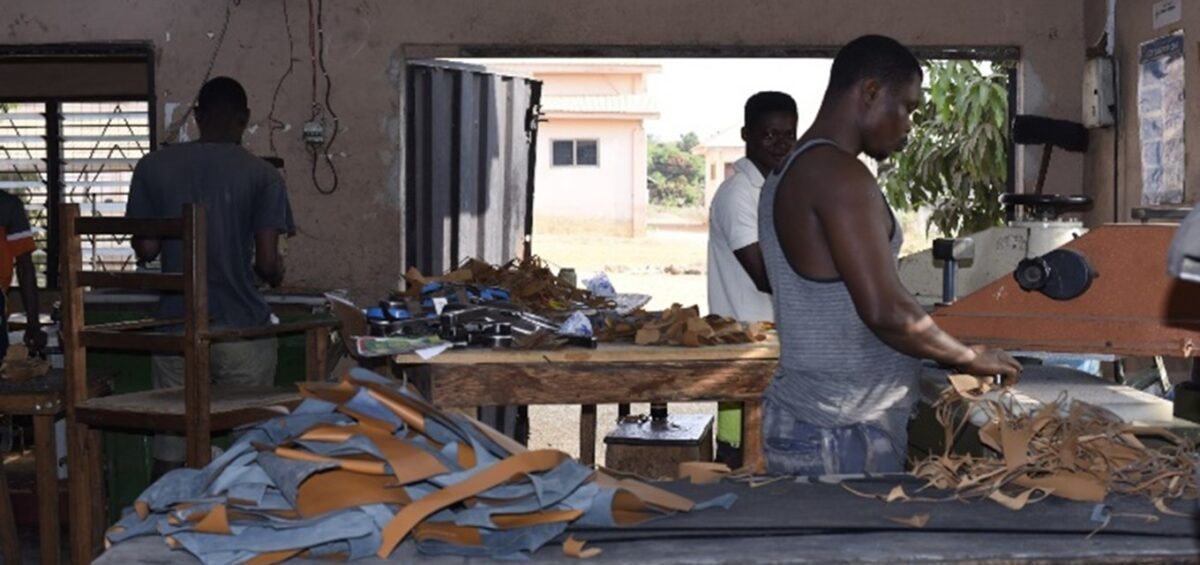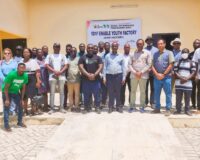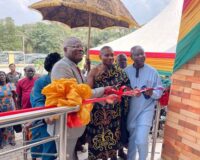For over two decades, A.A. Adjei Enterprise has been crafting quality footwear for the Ghanaian market, standing resilient in the face of numerous challenges. Despite the influx of cheap imports, fluctuating economic conditions, and limited access to raw materials, the enterprise has not only survived but thrived—thanks in part to the invaluable support received from REP, co-funded by IFAD. Today, A.A. Adjei Enterprise is a testament to how strategic partnerships and targeted capacity-building can transform small businesses and create sustainable livelihoods.
A Humble Beginning
The journey of A.A. Adjei Enterprise began in 1997 in the bustling Kumasi Central Market. With just two employees and a modest weekly production of 150 pairs of sandals, the business was fueled by the determination of its founder, Alex Akwesi Adjei. He envisioned a thriving local footwear industry, capable of competing with imported products and creating jobs for Ghanaian youth.
However, the early years were fraught with difficulties. Like many small enterprises, access to capital was a major hurdle. Despite investing in machinery to improve production, financial constraints made it difficult to scale up operations. The cost of raw materials was also a significant barrier, making it challenging to maintain competitive pricing in the market.
A Turning Point: Support from IFAD and REP
Akwesi Adjei’s breakthrough came when he was introduced to REP). Through REP, he received critical financial assistance, business development support, and technical training. This partnership marked a turning point for his business, helping him navigate the many challenges of the industry.
“I am grateful to the support I received through the Community-Based Rural Development Project (CBRDP),” he recalls. “Without it, sustaining my business from the early days would have been nearly impossible.”
Beyond financial assistance, REP facilitated access to specialized training that enhanced his business operations. Akwesi Adjei benefited from a range of capacity-building initiatives, including skills training, financial management workshops, and digital marketing sessions. One of the most impactful was a training program on internet marketing, which enabled him to expand his reach beyond local markets.
“The training I received helped improve the quality of my products and opened my eyes to new marketing strategies. Now, I am committed to continuous improvement,” he says.
Growth and Impact
With enhanced skills and financial support, A.A. Adjei Enterprise experienced remarkable growth. Production capacity increased from 150 pairs of sandals per week to over 600 pairs, allowing the business to meet rising demand. This expansion also created more employment opportunities, with the workforce growing to 10 permanent staff members, including four women. Additionally, the enterprise offers temporary employment opportunities to young people in the community, particularly during school vacations. Currently located in Asotwe, within the Ejisu Municipality of the Ashanti Region, the enterprise serves as a vital source of income for many households. Akwesi Adjei takes pride in his role as a mentor to young artisans, equipping them with the skills necessary to build successful careers in the leather industry.
Learning from Global Best Practices
In addition to support from IFAD through REP, Akwesi Adjei also benefited from partnerships with other agencies such as the Japan International Cooperation Agency (JICA). Through JICA, he participated in the “Kaizen” training—a Japanese productivity improvement technique that emphasizes continuous enhancement in production processes.
“The Kaizen training completely transformed the way we operate. We have become more organized and efficient, which has positively impacted our productivity and profitability,” he explains.
Such technical support has enabled A.A. Adjei Enterprise to remain competitive in an industry increasingly dominated by imported footwear.
Overcoming Challenges in the Footwear Industry
Despite the success of his business, Akwesi Adjei acknowledges the persistent challenges facing local shoe manufacturers in Ghana. Currency fluctuations and high-interest rates continue to strain financial stability, making it difficult for small enterprises to expand. Additionally, illegal mining activities (galamsey) have negatively affected business by increasing production costs. The influx of cheap imported shoes from China has further compounded the situation, making it harder for local producers to compete.
“In the past, schools had specific requirements for school shoes, which allowed us to dominate that segment of the market. But now, there are no strict regulations, and imported shoes have flooded the market, making it difficult to sustain growth,” he laments.
To ensure the sustainability of Ghana’s leather and footwear industry, Akwesi Adjei believes that key policy changes are necessary.
“To develop this sector, we need to source raw materials locally to reduce costs. The government should also consider reducing import duties on essential materials while enacting policies that promote local shoe production. For example, schools should be encouraged to purchase sandals made in Ghana. This would go a long way in revitalizing the local footwear industry.”
A Vision for the Future
Looking ahead, Akwesi Adjei remains optimistic about the future of his business and Ghana’s footwear industry. He envisions a thriving local manufacturing sector, where artisans have the support needed to compete on both national and international levels. His long-term goal is to expand operations further, create more employment opportunities, and contribute to making Ghana a recognized hub for quality leather products.
“My dream is to see more young people venture into the footwear business. With the right support, I believe Ghana can build a strong local industry that reduces reliance on imports and boosts employment,” he says with determination.
A.A. Adjei Enterprise stands as a beacon of resilience, innovation, and perseverance in Ghana’s leather industry. Through strategic support from IFAD and REP, this once small venture has transformed into a thriving business, impacting countless lives in the process. With the right policies and continued investment in local enterprises, Ghana’s footwear industry has the potential to flourish, paving the way for a future where local craftsmanship takes center stage on the global market.





